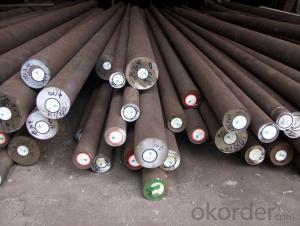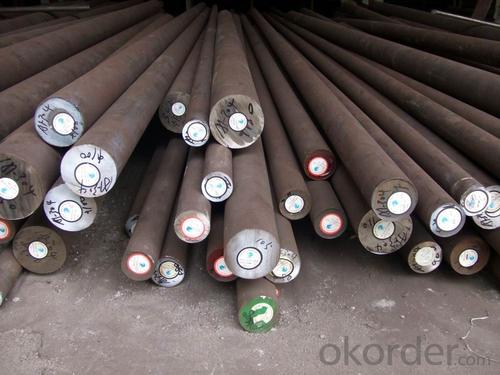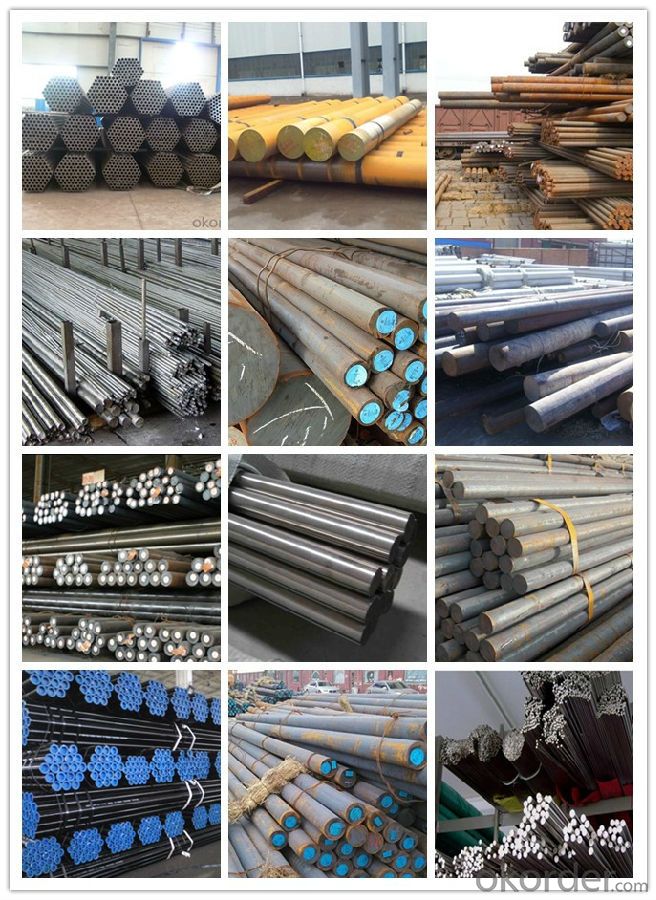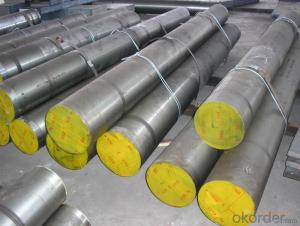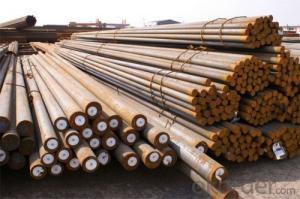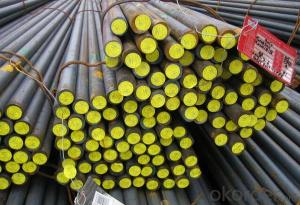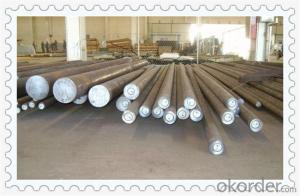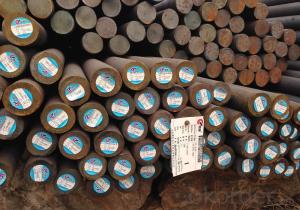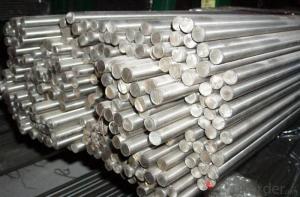Special Steel ASTM4140 Alloy Steel Round Bar
- Loading Port:
- China main port
- Payment Terms:
- TT OR LC
- Min Order Qty:
- 30 m.t.
- Supply Capability:
- 10000 m.t./month
OKorder Service Pledge
OKorder Financial Service
You Might Also Like
Specification
Product information
1. Grade: 4140,SAE4140, 42CrMo4, 1.7225,SCM440
2. Specification: Dia: 16~800mm Length:2000-13000mm or as required
3. Process: EAF+LF+VD
4. Technique:Forged
5.Treatment:hot rolled,cold drawn
6.Mechanical performance:
Strength of extension | 1080MPA |
Yield point | 930MPA |
Elongation | 12% |
Contractibility rate | 45% |
Impacting energy | 63J |
7.Chemical composition(for reference only):
Grade | C | Si | Mn | P≤ | S≤ | Cr | Mo |
SAE4140 | 0.38/0.43 | 0.15/0.35 | 0.75/1.00 | 0.035 | 0.035 | 0.80/1.10 | 0.15/0.25 |
8. Compared grades of 4140 steel
GB-China | AISI-America | DIN-GERMANY | JIS-Japan |
42CrMo | 4140 | 1.7225 42CrMo4 | SCM440 |
Product show
Workshop show
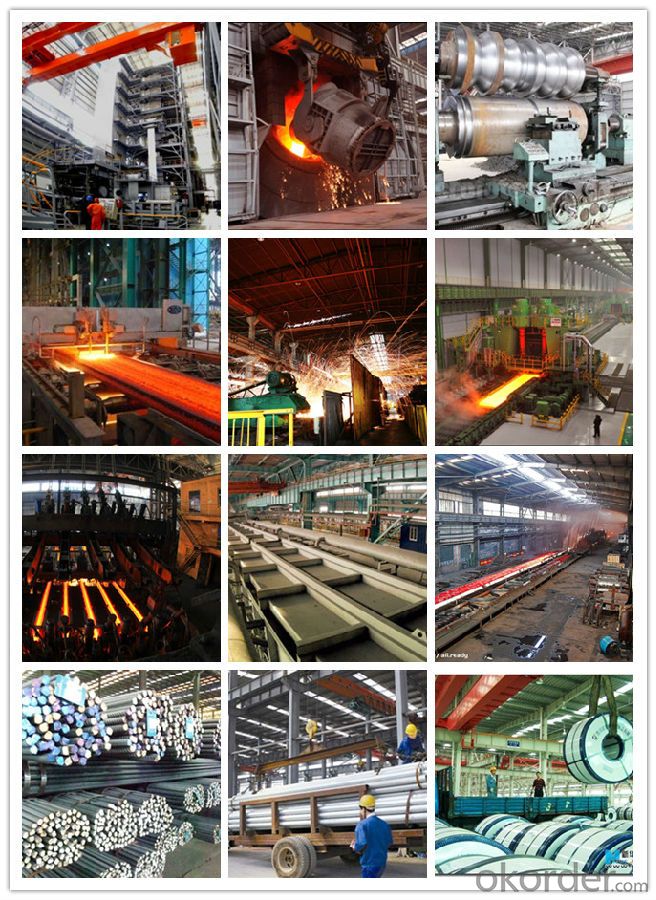
Shipping
1. FedEx/DHL/UPS/TNT for samples, Door-to-Door;
2. By Air or by Sea for batch goods, for FCL; Airport/ Port receiving;
3. Customers specifying freight forwarders or negotiable shipping methods!
Delivery Time: 3-7 days for samples; 5-25 days for batch goods.
Payment Terms
1.Payment: T/T, L/C, Western Union, MoneyGram,PayPal; 30% deposits; 70% balance before delivery.
2.MOQ: 1pcs
3.Warranty : 3 years
4.Package Informations: 1) EXPORT, In 20 feet (GW 25 ton) or 40 feet Container (GW 25 ton)
2)as customer's requirement
Why choose us?
(1) The leading exporter in China special steel industry.
(2) Large stocks for various sizes, fast delivery date.
(3) Good business relationship with China famous factories.
(4) More than 7 years steel exporting experience.
(5) Good after-sales service guarantee.
- Q: How does stainless steel contribute to the automotive industry?
- Stainless steel contributes to the automotive industry by providing strength, durability, and corrosion resistance in various automotive components such as exhaust systems, body panels, and engine parts. Its ability to withstand extreme temperatures and harsh conditions make it a preferred material for manufacturing high-performance vehicles. Additionally, stainless steel's aesthetic appeal and low maintenance requirements make it suitable for decorative purposes in car interiors and exteriors.
- Q: What are the requirements for special steel used in construction equipment manufacturing?
- The requirements for manufacturing construction equipment using special steel are strict and specific. Below are some important requirements: 1. Strong: Special steel used in construction equipment manufacturing must have high tensile and yield strength to withstand heavy loads and stresses. This ensures the durability and longevity of the equipment. 2. Toughness: The steel should have excellent toughness to resist fractures and deformations caused by impacts or dynamic loading. This is crucial for construction equipment operating in challenging environments. 3. Resistance to wear: Construction equipment is exposed to abrasive forces such as digging, scraping, and crushing. Therefore, the special steel should have high wear resistance to prevent premature wear and failure. 4. Protection against corrosion: Construction equipment often operates in harsh environments like construction sites, mines, and marine applications. The steel should have good corrosion resistance to prevent rusting and corrosion, which can weaken the equipment's structure. 5. Weldability: Construction equipment manufacturing involves various fabrication processes, including welding. The special steel should be easily weldable to ensure proper joining and structural integrity without compromising strength. 6. Heat resistance: In certain construction applications, equipment may be exposed to high temperatures or thermal cycling. Special steel should have good heat resistance to maintain its mechanical properties and structural stability under these conditions. 7. Ability to be shaped: Construction equipment often has complex shapes and structures. The steel should be easily formable to allow for easy shaping and fabrication of the desired components without compromising its mechanical properties. 8. Cost-effective: While meeting the above requirements, special steel used in construction equipment manufacturing should also be economically feasible. This means balancing the desired properties with the cost of production and procurement. By meeting these requirements, the special steel used in construction equipment manufacturing can withstand demanding conditions, provide long-term durability, and ensure the safety and efficiency of the equipment. Additionally, compliance with industry standards and regulations is crucial to guarantee the quality and reliability of the steel used in construction equipment manufacturing.
- Q: Can special steel be used in medical applications?
- Yes, special steel can be used in medical applications. Special steel alloys, such as stainless steel, are commonly used in the production of surgical instruments, orthopedic implants, and medical devices due to their excellent corrosion resistance, durability, and biocompatibility properties.
- Q: Can special steel be used in the mining industry?
- Yes, special steel can be used in the mining industry. Special steel, such as high-strength and wear-resistant steels, can be utilized for various applications in the mining industry, including the manufacturing of heavy machinery, equipment, and tools used in mining operations. These steels offer superior durability, strength, and resistance to abrasion, making them suitable for the harsh and demanding conditions present in mining environments.
- Q: How does special steel perform in magnetic applications?
- Special steel performs well in magnetic applications due to its high magnetic permeability and low electrical conductivity. This allows it to efficiently conduct and concentrate magnetic fields, making it ideal for various magnetic devices and applications such as transformers, motors, generators, and magnetic sensors. Additionally, special steel can exhibit excellent magnetic properties such as high saturation magnetization and low coercivity, making it capable of generating strong magnetic fields and maintaining magnetization even in challenging conditions.
- Q: What are the different non-destructive testing methods for special steel?
- There are several non-destructive testing methods for special steel, including visual inspection, ultrasonic testing, radiographic testing, magnetic particle testing, and liquid penetrant testing. These methods allow for the detection of surface and subsurface defects, such as cracks, voids, or inclusions, without causing any damage to the material. Each method has its own advantages and limitations, and the choice of testing method depends on the specific requirements and characteristics of the special steel being evaluated.
- Q: Can special steel be used for making electronics components?
- Indeed, electronics components can be manufactured using special steel. This term refers to a particular type of steel that has been meticulously designed and fabricated to possess distinct properties and characteristics that render it suitable for a wide range of applications, including electronics. Within the realm of electronics manufacturing, special steel finds utility in the creation of various components such as connectors, springs, contacts, and other parts that necessitate exceptional strength, durability, and resistance to corrosion and wear. These attributes are vital in ensuring the dependable performance and long lifespan of electronic devices. Furthermore, special steel also offers remarkable thermal conductivity, electromagnetic shielding, and magnetic properties, which are critical in specific electronic applications. For instance, in the production of transformers, special steel laminations are employed to minimize energy loss and enhance efficiency. Moreover, special steel can be customized to meet the specific requirements of different electronic components. For example, certain grades of stainless steel can be utilized to fabricate components that must endure harsh environmental conditions or come into contact with corrosive substances. Overall, the utilization of special steel in electronics manufacturing presents a viable solution for producing components that can meet the exacting performance standards of contemporary electronic devices.
- Q: What is the role of special steel in the construction industry?
- Special steel plays a crucial role in the construction industry as it provides strength, durability, and resistance to various environmental factors. It is commonly used in the construction of high-rise buildings, bridges, and infrastructure projects. Special steel's unique properties, such as high tensile strength, corrosion resistance, and heat resistance, make it suitable for critical applications where standard steel may not suffice. It ensures the structural integrity and safety of construction projects, making it an essential material in the industry.
- Q: How is corrosion-resistant steel used in marine environments?
- Corrosion-resistant steel is commonly used in marine environments due to its ability to withstand the harsh conditions of saltwater and prevent corrosion. It is utilized in the construction of ships, offshore platforms, and various marine structures. The steel's high resistance to corrosion prolongs the lifespan of these structures, ensuring their durability and safety in challenging marine environments.
- Q: What are the different impact-resistant grades of special steel?
- Steel alloys known as impact-resistant grades are designed to withstand high impact and shock loads without fracturing or deforming. These grades of steel are crucial in industries like construction, mining, automotive, and defense, where resistance to impact and toughness are essential. Numerous impact-resistant grades of special steel are available, each with its own unique characteristics and properties. Some commonly used grades include: 1. AR400: This steel has a hardness of 400 Brinell (HB) and is highly resistant to abrasion and impact. It finds applications in bucket liners, crushers, and hoppers where wear resistance is critical. 2. AR500: With a hardness of 500 HB, AR500 steel offers even greater resistance to wear and impact compared to AR400. It is frequently used in heavy machinery, mining equipment, and armored vehicles. 3. AR600: This steel boasts a hardness of 600 HB, making it one of the toughest and most impact-resistant options. It is ideal for applications that require extreme wear resistance and durability, such as chutes, conveyors, and ballistic protection. 4. T-1: T-1 steel is a high-strength, low-alloy (HSLA) steel that delivers excellent impact resistance and toughness. It is commonly utilized in structural components, heavy equipment, and offshore drilling rigs, where high strength and toughness are essential. 5. QT or Quenched and Tempered Steels: These steels undergo specific heat treatment to enhance their toughness and impact resistance. They are popular in applications that demand high strength, toughness, and impact resistance, such as gears, shafts, and armor plates. It is important to note that the impact resistance of a specific steel grade depends not only on its composition but also on factors like heat treatment, fabrication techniques, and design considerations. Therefore, consulting steel manufacturers or experts is crucial in determining the most suitable impact-resistant grade for a particular application.
Send your message to us
Special Steel ASTM4140 Alloy Steel Round Bar
- Loading Port:
- China main port
- Payment Terms:
- TT OR LC
- Min Order Qty:
- 30 m.t.
- Supply Capability:
- 10000 m.t./month
OKorder Service Pledge
OKorder Financial Service
Similar products
Hot products
Hot Searches
Related keywords
